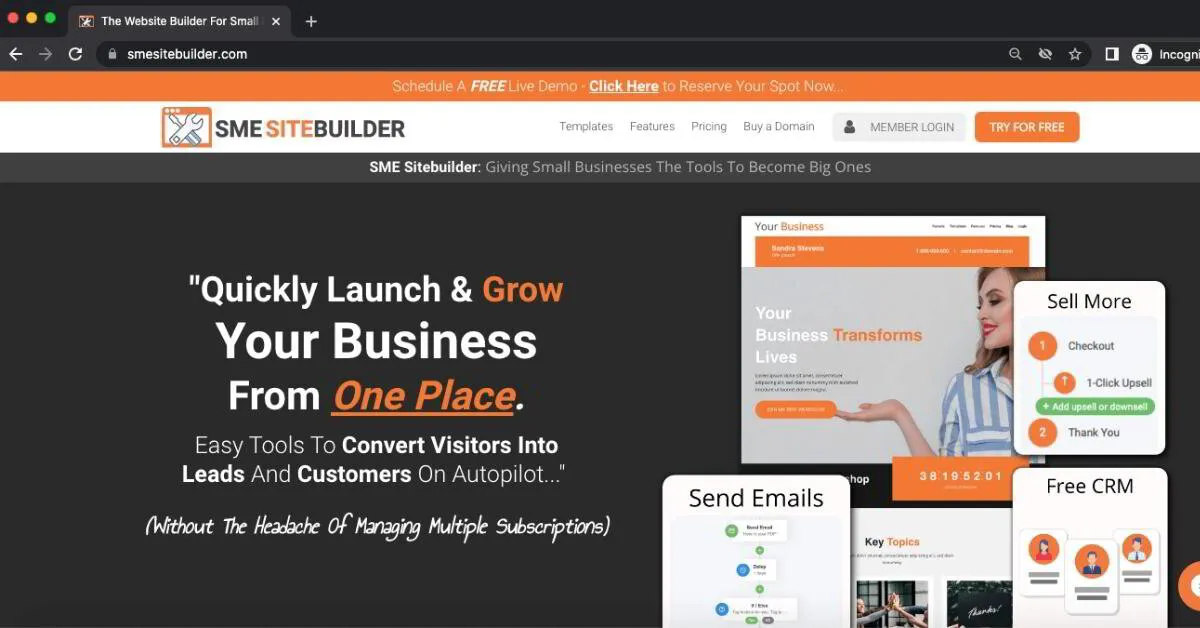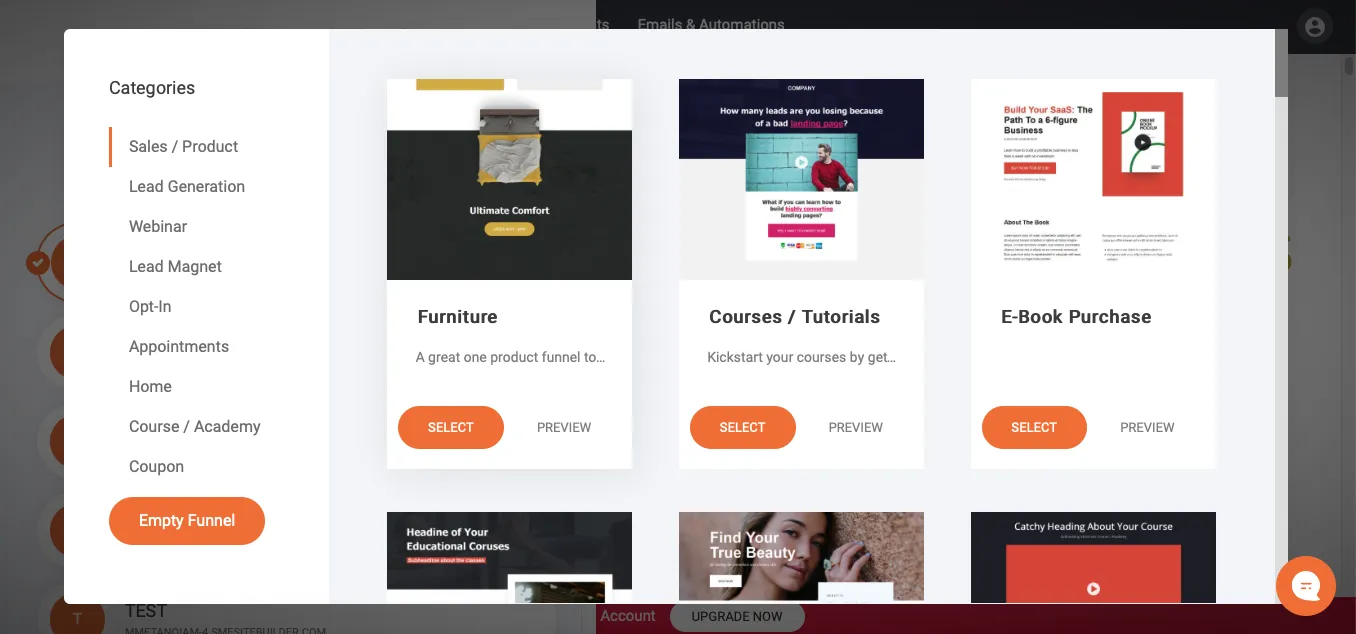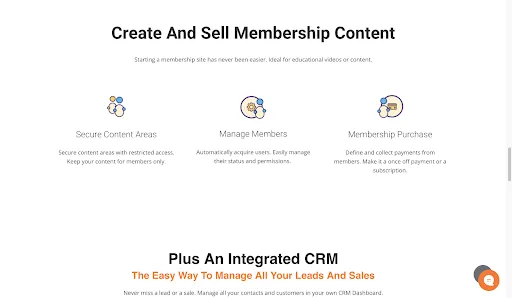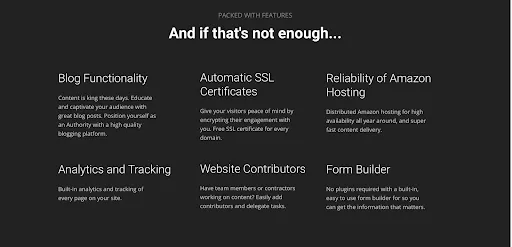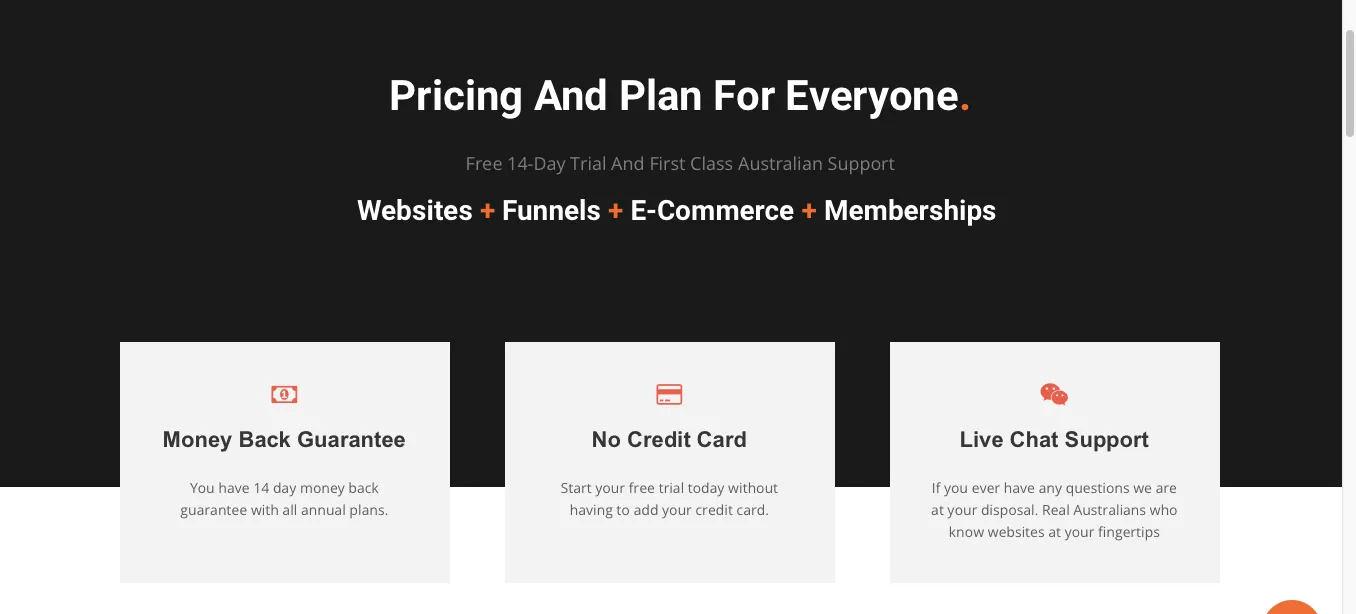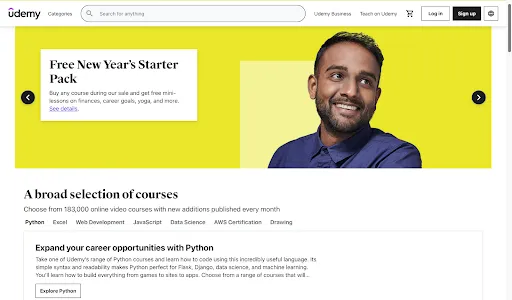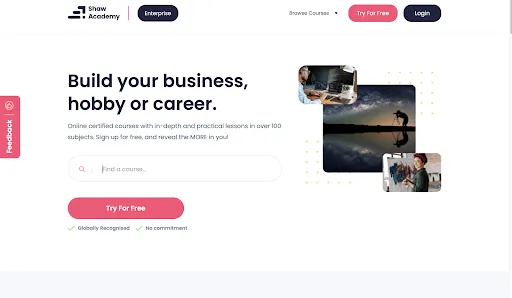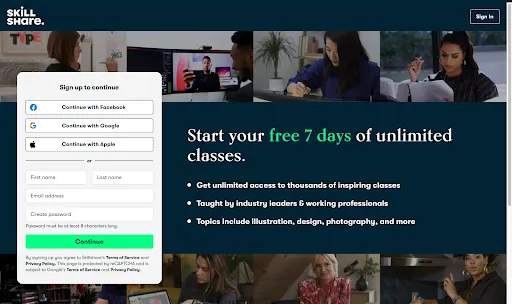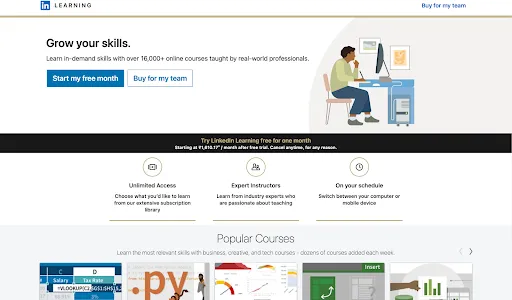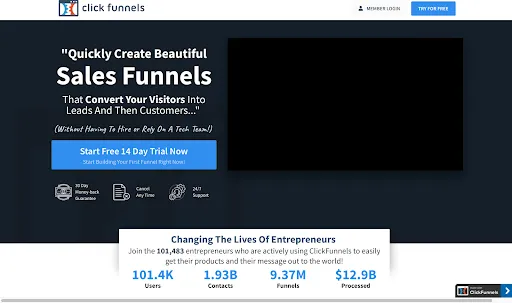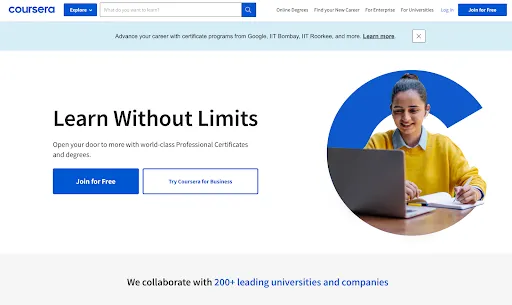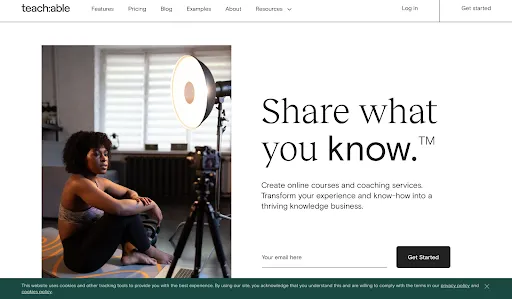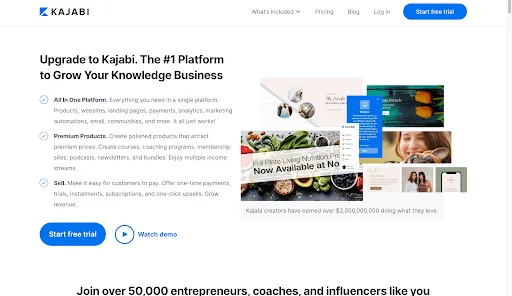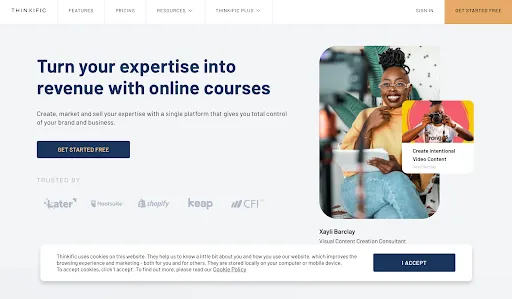Virtual Education and Online courses have revolutionized the education scheme on a global scale. According to Forbes, the e-learning and online course empire will be worth $325 billion by 2025.
Are you ready to tap into this market and sell online courses?
You need the best online course platform to publish your courses.
Whether you've got a small budget or big budget, are just getting started, or have a ton of experience with online course creation, hate tech, or are a tech expert - you'll find out which platform type suits you the best.
The course platform you choose is vital to your online course business and shouldn't be taken lightly.
Unfortunately, it is not enough to have the knowledge you want to share with students. There is a need to cultivate that knowledge and share it in an environment where clients can take advantage of it.
This is where online learning platforms can come in handy. Let us first understand what they are.
What are Online Course Platforms?
Online learning platforms are Learning management systems (LMS) that offer a ready-made infrastructure built to create and set up a profitable online course quickly.
There are various options to select from. Some of them are very useful while some are not. Most online course platforms allow the students to progress at their own pace and comfort.
They aim to compensate for the lack of human touch by providing an immersive learning experience using engaging content, gamification, quizzes, forums, certificate & badges, videos, PDFs, audio, etc.
Never before, online learning through courses was so present in our lives. After the global pandemic, online course platforms have been a good way of developing a profitable online business for Instructors, trainers, and aspiring entrepreneurs.
In this article, We will be sharing with you the Best Online Course Platforms that you can use to learn various skills or generate income leveraging those skills. Let’s dive in.
What Are the Best Online Learning Platforms?
How do I start an online teaching platform?
Step 1: Choose how you will teach online
Option A: Physical Blackboard or Whiteboard
Option B: PowerPoint Presentation
Step 2: Plan your content and break it into modules
Step 3: Create Worksheets and Quizzes
Step 4: Start recording the videos.
Step 5: Publish the course content on an online course platform
What courses are people searching for?
1. SME Sitebuilder
SME Site Builder is our advanced business website builder built specifically with small to medium enterprises (SME’s) in mind. Using this wonderful tool, you can build high-converting websites, blogs, marketing funnels, online stores, and membership websites.
It is one of the best funnel builders out there, with many useful features that our users love. We provide you with your own integrated CRM to easily manage all your sales and leads.
Just send your audience down a marketing funnel with landing page designs that convert visitors into paying customers, and we will measure the conversation between each step for you.
Easy Drag & Drop options can set up a complete professional-looking website in minutes. There are over 200+ High-Speed templates from different categories. You can pick any template of your choice and start editing the content right away.
It is the fastest and simplest way to start selling online. Super clean and responsive course pages, discounts, payments. and it’s all just a couple of clicks away.
Once your website store is ready, you can start listing Physical Products, Digital Products, Services, and Memberships.
The best part is that you also get to keep all your profits since we don’t charge any commission on your store's sales. There are multiple payment processors that you can link to your online store, including Stripe, Braintree, Paypal, 2Checkout, and Afterpay.
SME Site builder lets you secure content areas by adding a layer of password protection in the areas where you create and share your course.
You can add multiple videos, pdfs, and text content to your course page and design it as per your liking. We also let you automatically acquire users and manage their status and permissions with ease.
You get to define and collect payments from your members. You can charge them once off payment or a subscription-based model.
We understand the importance of integration with your favorite automation tools. Integrate apps like Activecampgain, Mailchimp, Google Analytics, and Getresponse from your dashboard directly.
There are many more advanced marketing features that you can use to sell more physical/digital products/addons with your course.
You can create custom pop-ups from scratch for your course page. These pop-ups will allow you to engage your visitors with exit intent offers or newsletter subscriptions.
Another highly appreciated feature of SME Site builder is its in-built advanced A/B Testing. You can use this feature to test the conversions of different landing pages to increase your online business ROI.
We offer a 14-Day Free Trial to anyone who wants to try the service. (No credit card needed). Sign up for the 14-Day Free Trial from here.
Price:
- Small Website- $27 /month annually or $37 month-to-month
- Business Website- $47 /month annually or $57 month-to-month
- Website + Funnels- $79 /month annually or $89 month-to-month
- Growth- $147 /month annually or $167 month-to-month
Note: Each package has different features assigned for various use cases. You will need a higher plan if you need unlimited storage, bandwidth, and pages. Click here to see the plans and features.
We also have a free affiliate program for anyone who wants to earn a recurring income just by referring people to SME Site builder.
2. Udemy
Udemy is considered to be one of the most popular online learning platforms. It has a huge library of over 183,000 courses with great content. Most premium courses are paid, while some are available for free. It is a good place to start your online learning.
The Udemy courses are divided into thirteen categories: Business, Marketing, IT & Software, Music, Personal Development, Teaching & Academics, Design, Lifestyle, Photography, Health & Fitness, Office Productivity, Finance & Accounting and Development.
Users can expand their knowledge and skills in any field of their choice. 60,000+ Instructors are working with Udemy to enroll courses in 75 different languages. Some courses offer accreditation to professional bodies, but most of them do not lead to official qualifications.
It is an online education platform built for professional adults who want to update their skills or be more competitive in their field of work. In addition, it lets professionals create their own courses, then promote them to generate income.
To set up a paid course on Udemy, you will have to become a premium instructor. Once your application gets approved, you will get easy-to-follow steps to help you build your first online course. You will need at least 30 minutes of video content divided into five lectures. It also gives you tools to add assignments, quizzes, and discussion prompts.
It has a massive marketplace with over 46 million students users and monitoring tools that you can use to track each student's progress.
You can also use Udemy’s tailor programs to get features in their email marketing campaigns or join their affiliate marketing platform, where they pay you commission for the purchases you bring in through custom links. These are additional features that you can use to promote your course.
Through Udemy for Business, you have access to a wide range of courses built to improve the corporate training process significantly.
One problem is that you may have to dig deep to find diamonds in the rough since Udemy is a low-cost online learning platform.
You can access Free Udemy courses from here, and there is also an application that you can install on your smartphone to access your online courses as many times as you want.
Price:- Udemy is free for selling premium courses. It charges a 3% revenue share on the course sales revenue by the instructor.
Sign up for Udemy from here.
3. Shaw Academy
Shaw Academy is a Dublin-based learning platform with a catalog of dozens of courses to choose from.
The first course on Shaw Academy was published almost a decade ago - in 2012. Since then, the platform has offered over 100 online courses, and more than 12 million students from all around the globe have enrolled in these courses.
It provides courses in various categories, including Photography, Finance, Health & Wellness, Marketing, Technology, Design, Beauty, Music, Business, and Language.
The platform is pretty similar to Udemy. The only difference is that the courses listed here are more high-quality and longer in duration. So, it will take you 2-3 months to complete any course at Shaw Academy.
The main key is that it can also provide you with the diploma and certified certificates for many advanced courses.
One problem with Shaw Academy is that it relies on advertising to sell the courses on the platform. This means that it will bombard the users with information about other courses when they visit the course they are actually trying to pursue.
Let us now discuss some of the problems with Shaw academy. This platform was flagged on Trustpilot on 18 June 2020 for breaching the guidelines by inviting users to leave biased reviews.
It also has a confusing pricing structure. Some users have reported being charged for payments they didn’t intend on paying.
Another major drawback with Shaw Academy is that not everyone can post their course on this platform. It only lets limited instructors create a course.
Firstly, you will have to join the platform as an instructor; then, they will review your application, and after that, you will be able to create courses.
So if you were looking for a platform that prioritizes the instructors, you can skip Shaw Academy and choose the other ones from our list.
Price: Every course at Shaw Academy is priced at $58.73 per module. To get free access to all the courses, you will have to buy the premium membership at $39/month quarterly, $35/month half-yearly, $19/month yearly, or a single charge of $99 for a lifetime.
Note: The reputation of this platform has taken a major hit because of poor customer support and billing issues. Ever since the Trustpilot debacle, users have been switching over to other alternatives of Shaw Academy, and we suggest you do the same.
Sign up for Shaw Academy from here.
4. Skillshare
Skillshare is a gigantic marketplace built for creative education. With Skillshare, you can learn anything from music production to graphic design to fine art and digital marketing.
The main focus is on creative works, entrepreneurs, and freelancers. Classes are designed to make users actively engage primarily with the video.
It currently has about 5 million users and has paid more than $5 million to the tutors on the platform. Every class on Skillshare is 20-60 minutes long in duration and is divided into 5-6 short lessons.
Just like other online courses platforms, Skillshare also has various categories listed on its website. You can find good quality courses in virtually every category.
It also gives you access to a community discussion to connect with other students who have taken part in the same courses as you. There is also a separate community forum for all the teachers with answers to all frequently asked questions.
Remember one thing if you want to get paid for your Skillshare courses, then you will have to make sure your lessons are part of the Skillshare premium catalog. Anyone can enroll and share a course with their friends and colleagues, but they can only start earning money in the premium catalog.
It also offers teaching resources to everyone who wants to start teaching courses. These resources include the fundamentals of planning, filming, and publishing classes on Skillshare.
Skillshare basic is technically free, but most courses are locked in the free version. If you want to access all the courses, you will have to buy their premium membership. It does offer a one-month free trial for new sign-ups.
You can access the courses from your smartphone by downloading the Skillshare app either on the Google play store or App store.
According to the company’s website, they pay over $100,000 per year to the top tutors on their platform. However, It is the only platform on this list that uses a royalty pool system to pay the instructor. This is why it is tricky to calculate the transaction fees they charge.
Price: $19 monthly for premium membership. Each month, 30-50% share of Skillshare’s premium subscription revenue is paid to a royalty pool for teachers. Instructors get paid for each minute of content watched.
Sign up for Skillshare from here.
5. LinkedIn Learning
Formerly Lynda.com, Linkedin Learning is a professional online course (MOOC) platform by the social media giant Linkedin.
It offers a gigantic library with over 16,000+ courses in Technology, Business, and Technology categories. The community has over 700+ million users from more than 200 countries worldwide. The quality of courses is assorted; however, the courses could have been divided better, because sometimes it gets hard to find what you are looking for.
Some of the most popular courses on the platform are Finance and Accounting Tips, Effective Learning, Introduction to Graphic Design, Python Essential Training, and Time Management Fundamentals.
You can access these courses on the website or the mobile app. Once purchased, the courses can also be downloaded for offline consumption.
When users sign up on Linkedin Learning, they are served with personalized course recommendations based on their interests and skills.
They also provide you with a certificate of completion whenever you complete any course. This certificate can be shared to your public Linkedin profile. These certificates were common in the days of lynda.com, too; however, they don’t necessarily hold any value in the real world.
To become an instructor and create online courses on Linkedin Learning, you will have to submit an application form. The complete procedure is quite different from the other online course platforms. Linkedin hires mostly authentic experts who are well-known thought leaders in their space.
When you become a Linkedin Instructor, you will be working as a contractor to create and publish courses for the platform. You will have to maintain a long-term relationship with your producer and content manager.
After you sign your contract, they will pay you half of your royalty advance, and the other half is credited whenever the course gets published.
Your courses will stay up on the platform for as long as Linkedin Learning wants to keep them up. This means that you don’t have control over when your content is removed.
One drawback with Linkedin Learning is that the courses tend to be short and targeted towards beginners. It provides more of a skim or overview and not a detailed explanation.
Price: Linkedin Learning gives you the option to either pay for individual courses or sign up for a monthly or annual subscription. The monthly subscription comes at $29.99/month, and the Annual subscription costs ($239.88) working out at $19.99/month. The cost of individual courses ranges from $20 to $40 plus tax. It also does offer a 1-month free trial.
Start your Linkedin Learning free trial from here.
6. Clickfunnels
You can use Clickfunnels to build a sales page for your online course, webinar registration, membership site, and digital product. Like any other funnel builder, it provides you with a wide variety of pre-built templates perfect enough to meet your requirements.
With the Drag & Drop page builder, you can build a landing page for your website without any coding experience. The UI of the Page builder is just like any simple picture editing software, so you don’t have to rely on the programming team.
One problem with Clickfunnels is that you may not achieve as much customization as you want because the software focuses so much on simplicity.
Clickfunnel membership platform lets you provide exclusive content to members only. You can allot separate videos, images, and text material to the members in an exclusive section.
There are a lot of third-party integrations that Clickfunnels support. These apps are Active Campaign, HTML Form, Mailchimp, Avalara, Zoom, Facebook, and many more.
To see your progress, you can go to the Sales analytics feature in Clickfunnels. This tool will provide you with all the statistics of your online business. Sales analytics will show you the geographical data of your customers, their reactions to different stages of the funnel, and some marketing tips to boost your sales.
The Shopping Cart system takes care of all the payments for your digital products with ease. One key feature is the ability to add Upsells, downsells, and bump offers to your landing pages to increase the average purchase ticket of your customers.
Actionetic is another email marketing tool that comes built-in with Clickfunnels. You can use this feature to connect with your subscribers and deliver more products or content.
Clickfunnels also boasts about its mobile text alert feature. After integrating your Clickfunnels account with any SMS marketing service, you can create an SMS from your dashboard.
Price: The basic plan of Clickfunnels starts at $97/month, and the Platinum plan is priced at $297/month. There is also a third tier, the Two Comma Club, exclusive to the existing click funnel clients who have generated more than $1 million.
Sign up for Clickfunnels from here.
7. Coursera
Coursera is a good learning solution for those who want to learn about STEM and data science. It is a reliable platform that lets you participate in university-level courses and certification programs.
It was built by two Stanford University professors who wanted to make their teachings reach as many people as possible.
All the instructors that make courses for Coursera are professionals from top companies and universities like Stanford, Duke, IBM, Princeton, Yale, and many more.
This is why you should probably skip this one if you are looking to teach on this platform. Only a few get selected out of all the people who register to become an instructor on the platform.
The general themes of the courses listed on Coursera are Arts & humanities, business, computer science, data science, information technology, life sciences, mathematics and logic, personal development, physical sciences and engineering, social sciences, language.
It also offers several master's degrees, for example, in Computer Science, Innovation and Entrepreneurship, Public Health, and Business Administration, to name a few.
The instructors get paid 40% of the revenue generated by the course sales. On Coursera’s website, Every course is listed for a different price which varies from $29 to $99. However, most of the courses have an option to audit the course. This audit option lets you partake in any course for free.
The only drawback with auditing a course is that you will not receive graded assignments or a certificate, but still, you can study the complete content of the course to learn any skill for free.
Coursera has a Specialization feature that you can use to master a specific skill. Specialization is a series of online courses that take 4-6 months to complete. On completing the specialization, you will receive a certificate to add to your resume.
It is one of the only platforms you can use to pursue online degree courses granted by world-class accredited universities. Online degrees will cost you much less than on-campus degree courses, and you can even complete them faster.
Price: Like Udemy, you can join Coursera for free, but every course is priced at a different rate. The Pricing of Courses ranges from $29 to $99, Specializations from $39 to $79 per month, and academic degrees range from $15 to $ 25,000.
Sign up for Coursera from here.
8. Teachable
Convert your knowledge into an income stream by building a course with Teachable. More than 100,000 tutors on this platform have made millions by selling their training and courses.
It has a simple user interface that offers all the features you need to compete with the other tutors on the platform.
The platform lets you access everything needed to prepare a professional course and sell it. Tech-savvy or not, it will make the complete procedure of building a course easy and stress-free.
There are various customization tools available that you can use to personalize your content the way you want it.
The power editor can add multimedia, videos, and other elements to the course. You can track all the students' analytics through the comprehensive dashboard in the interface.
You can also use the dashboard to create landing pages, develop your online courses, manage your students, set the pricing and drip content, and manage comments.
One good thing about Teachable is that it automatically handles the EU VAT for you. You can receive your international payments in 130 different currencies without worrying about taxes.
Various integrations are supported in Teachable. It can also be linked to Calendly to book leads and convert them into students. When your students complete the course, you can also issue them certificates through Teachable.
If you want to receive feedback from the people who partake in your course, this can be done by integrating Google forms to Teachable. Content can also be quickly imported to the learning management systems from Google drive, One-drive, and Dropbox.
It also comes with some built-in marketing tools. You can use them to create email lists and manage campaigns, create and publish coupons and promotions, configure some advanced pricing options, configure your sales pages, and even create your own affiliate links.
Price: The basic plan of Teachable starts at $39/month, whereas The Pro plan is priced at $119/month, and it lets you access some advanced features like Affiliate marketing, advanced reports, and certificates. The Business plan is available for $249/month, and it offers some more powerful features that can be used for scaling the business.
Note:- There is a 5% transaction fee in the basic plan while there is no transaction fee in the other plans.
Sign up for Teachable from here.
9. Kajabi
Kajabi is another course creation platform known for powerful automation. It is a complete cloud-based system with multiple customizable site themes to create high-quality unlimited courses.
Creating, hosting, marketing, and selling digital products can be done using this all-in-one web-based software. It provides you with a dashboard to monitor all of your business, products, audience, and marketing.
It even lets you manage all of your email marketing within Kajabi, including automated follow-up sequences, so there is no need for any third-party tools. The email templates they offer are easy to set up and good-looking. You can set up an endless amount of triggers, lists, email series, and automation to nurture your visitors when they enter your territory.
Kajabi also promises strong video streaming capabilities because it comes with Wistia. Wistia is a paid video hosting platform that comes fully integrated with Kajabi for uploading and streaming videos.
This means that you can upload all your content and gather it in one place using Kajabi. For example, if you are selling an online course, it will include Module descriptions, videos, audios, implementation support, resources, and anything else that you want to add.
It also comes with Pipelines which you can use to design sales pages and merge landing pages with checkout pages seamlessly to reduce the number of steps your visitors need to go through to close the sale on your website.
The core focus of Kajabi is online course creation which allows you to create several digital products, including online courses, memberships, subscriptions, and more.
Creating your website with Kajabi is also a piece of cake. It has a big collection of templates to choose from. Just select your template and make a few drags & drops to set up an entire online store.
Another benefit that you get with Kajabi is that you can create your own course community areas to engage with your students. Your students can access your course on a desktop or the Kajabi mobile app.
Price: Kajabi offers three plans:
Basic Plan ($119/month): 1 website, 1 admin, 3 products, 3 pipelines, 10,000 contacts, and 1,000 active members.
Growth Plan ($159/month): 1 website, 10 admins, 15 products, 15 pipelines, 25,000 contacts, 10,000 active members.
Pro Plan ($319/month): 3 websites, 25 admins, 100 products, 100 pipelines, 100,000 contacts, and 20,000 active members.
Sign up for Kajabi from here.
10. Thinkific
Thinkific is another all-in-one platform that you can use to create your own course website. They boast about helping 51,000 instructors earn about $340 million.
It is also one of the only course platforms that offer a viable, long-term, free plan that you can use to start selling online courses. Thinkific does not charge you any transaction fees on free or paid plans. This means you will have to pay commission charges only to the payment processor (Paypal, stripe, etc.).
The only major drawback with free plan is that you are assigned a thinkfic.com domain address by default - e.g., thinkdifferent.thinkific.com. By upgrading to any paid plan, you will be able to add your custom domain.
You can easily organize your course's content, and digital downloads using this tool's Drag and Drop features. An expiry date can also be set on any courses you produce.
You can easily brand your course and storefront to look like your website with the customization tools.
If you know how to code, Thinkific will also give you the full access to modify HTML and CSS as well.
It also gives you the option to charge your students a monthly recurring subscription for more expensive courses.
One drawback with Thinkfic is that you don’t get any course marketplace to market your online course. There is also no app for integrated email marketing, so you will have to use third-party tools like Mailchimp and Aweber.
Also, you don’t get an integrated sales funnel builder in Thinkific. Although, you can tie third-party funnel builders into the dashboard.
Creating an online course with Thinkfic will give you multiple templates to select from. These templates are Blank, Mini-course, Flagship course, Pre-sell, Digital download, Membership Resource Library, and Webinar Replay.
Any of these course templates can be modified as per your liking. It provides multiple options to delete sections and add new sections to your course. Throughout creating the course, you will be provided with “Smart coach course building tips” to help you.
Price: The Basic plan of Thinkific starts at $49/month, the Pro plan starts at $99/month, and the Premier plan will cost you $499/month.
Note:- Thinkfic does not offer any chat support. If you want priority phone support on Thinkific, you will have to select a higher plan.
Sign up for Thinkific from here.
How do I start an online teaching platform?
Let us now discuss a step-by-step guide on how you can start creating an online course.
Step 1: Choose how you will teach online
The first decision you need to take is how you plan to deliver your teaching to the students. There are multiple ways in which you can deliver the content.
Option A: Physical Blackboard or Whiteboard
The simplest way is to record yourself in front of a Physical Blackboard or Whiteboard. It is also the best option for teachers who feel comfortable teaching in front of the board in classes.
Option B: PowerPoint Presentation
Another option is to use PowerPoint presentations to teach your course. You will need to install Microsoft Powerpoint software on your PC to do this.
Creating a Presentation in Powerpoint is very easy, even for beginners. Just make sure to keep your presentation both fun and informative. The slides should not be text-heavy.
Also, you can record yourself explaining each slide, either through a video or audio voice-overlay.
Option C: Online Whiteboard
For this method, you will need an electronic pad and a pen.
Download any free Open board software, and you are good to go!
Step 2: Plan your content and break it into modules
The next step is to focus on the content of your online course. It would be best to make sure that the lectures are easy to understand for students. You can do this by breaking down the course into smaller modules.
According to research, the optimal video duration for students to grasp is 10-15 minutes. Remember that your goal should be to break the entire topic into smaller sections that are important enough by themselves.
This will help your students consume bite-sized content to grasp it easily.
Step 3: Create Worksheets and Quizzes
This is the part where you have to put your creativity to use to create engaging worksheets and quizzes.
Later, we will host and arrange these quizzes and worksheets on the online course platform.
This will allow you to improve the outcome for your students by adding tests at the end of each module.
Step 4: Start recording the videos.
Finally, it is time to record your videos for the online course. It is better to give this step a little time. You can record the complete course module by module.
Step 5: Publish the course content on an online course platform
Once you have all the course data ready, you can now use any of the mentioned online course platforms to publish your course!
What courses are people searching for?
Now, we will discuss some courses that are being searched by thousands of internet users every day.
#1: Finance & Cryptocurrency
Professionals and students are always looking for new skills that are most relevant “right now.” Bitcoin, Blockchain, Cryptocurrency are topics that have been trending like crazy. How-to courses that revolve around cryptocurrency are selling like hotcakes.
The recent backlash against cryptocurrency in a few countries has dampened the sparkle, but it still is fascinating across learners.
#2: Technology
STEM courses are in very high demand. This includes all the courses based on technology like Cloud, Data Science, Artificial intelligence, Robotics, Automation, Coding languages, etc.
#3: Marketing
There are many people interested in marketing-related courses such as Social media management, google analytics, Facebook, Twitter, Instagram outreach analytics, customer engagement metrics, etc.
#4: Entrepreneurship
Entrepreneurship courses go hand in hand with marketing courses. The same audience that enrolls in marketing courses also shows interest in courses that teach entrepreneurship, business skills, business management, and investments.
Which course will have more demand in the future?
Lastly, let us now look at some of the courses that will have more demand in the coming future. We made sure to pick the courses with growing demand and increasing google trends analytics.
#1: Finance & Cryptocurrency
Professionals and students are always looking for new skills that are most relevant “right now.” Bitcoin, Blockchain, Cryptocurrency are topics that have been trending like crazy. How-to courses that revolve around cryptocurrency are selling like hotcakes.
The recent backlash against cryptocurrency in a few countries has dampened the sparkle, but it still is fascinating across learners.
#2: Technology
STEM courses are in very high demand. This includes all the courses based on technology like Cloud, Data Science, Artificial intelligence, Robotics, Automation, Coding languages, etc.
#3: Marketing
There are many people interested in marketing-related courses such as Social media management, google analytics, Facebook, Twitter, Instagram outreach analytics, customer engagement metrics, etc.
#4: Entrepreneurship
Entrepreneurship courses go hand in hand with marketing courses. The same audience that enrolls in marketing courses also shows interest in courses that teach entrepreneurship, business skills, business management, and investments.
Which course will have more demand in the future?
Lastly, let us now look at some of the courses that will have more demand in the coming future. We made sure to pick the courses with growing demand and increasing google trends analytics.
#1 Data Scientist
The first decision you need to take is how you plan to deliver your teaching to the students. There are multiple ways in which you can deliver the content.
#2 Data Analyst
The job of a Data Analyst is to make the data understandable for everyone. It is a good field for anyone good at maths and statistics.
A Data Analyst also needs to be proficient in programming languages like Python and SQL.
#3 Blockchain Developer
Many industries like Finance, health, logistics, transport, etc., are looking for blockchain developers to help them get ready for the future.
It is a very advanced subject that will require you to be proficient in various skills, including Programming and Cryptography.
Conclusion
This was our list of Best Online Course platforms that you can use to start selling online courses. Whether you have a passion for teaching, want to grow your audience, or are looking to earn an income for your course, a platform available to help you achieve all these goals.
Click here to start your 14-Day free trial with SME site builder to sell courses at 0% transaction fees! Also, thanks for reading till the end, and make sure to subscribe to our newsletter for more amazing content.


